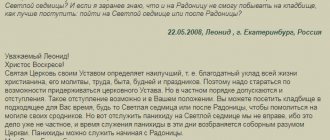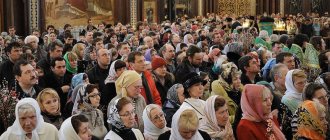Childbirth and temple visit
The church has special canons. According to them, only people who are spiritually and physically pure are allowed to touch everything holy. The church classifies the period of natural cleansing of the female body as physical impurity.
When spiritual shepherds are asked when a new mother can enter the church, they answer clearly and specifically: 40 days after giving birth. Then the mother is allowed to enter the temple with her baby. On this day, the clergyman offers a prayer for the mother, then for the baby. If before this period the baby has already been baptized, then the ritual of his churching is performed. This is a special sacrament, after which the child becomes a servant of God, a member of the Church of Christ.
There are several reasons why a woman who has recently given birth is prohibited from visiting the temple:
- Female uncleanness. During the period of postpartum discharge, the female body is cleansed and gets rid of impurities.
- Blood must not be shed in the temple. In ancient times, there were no special products that women use today for menstruation (pads and tampons). This is another taboo on visiting church on menstrual days.
- A large number of parishioners. Crowds of people in church can negatively affect a woman’s health. After all, not entirely healthy people come there. But for women with weakened immunity after childbirth, such contacts are not suitable. And active contacts with the outside world interfere with the natural unity of mother and baby.
Why do you have to wait exactly 40 days? Because physiological discharge in women after childbirth lasts approximately 6 weeks. This is exactly the 40 days needed to restore the body. This period should be devoted to taking care of your physical health, and then - about your spiritual health.
Let us note that today the opinions of spiritual shepherds regarding the observance of the forty-day taboo on visiting church are divided. Some believe that women can attend church services at any time, but after giving birth they cannot receive communion for up to 40 days. Others are categorically against women coming to the temple during this period. Therefore, a woman is recommended to pray for the baby in her own words or read special prayers for the granting of patience, dedicated to the protection of children. The child’s father, his grandmother, grandfather, and other relatives can go to church and light a candle for the well-being of the family. They bow to the icon of the Mother of God, St. Nicholas the Wonderworker, with mental requests to protect the child, protect him from trouble, grief, and give the mother the strength to raise the child. You can serve a prayer of thanks for the safe birth of the baby, or submit a note for the health of the baby’s mother, if she is baptized. Sorokaust is also served for her health. Spiritual care for a woman’s health is also the protection of her baby, because they are closely related.
Today, many parents try to baptize their child as soon as possible - a week, two, three after birth. And the ritual of churching takes place later, after 40 days from the moment the baby is born. And then his mother comes to the temple with him, bringing the child closer to spiritual shrines and rituals.
I recently gave birth to a daughter, I wanted to go to church with the child, but my aunt said that forty days after giving birth a woman has no right to visit the temple. Why?
- “Cleanse from all sin, and from all defilement... make her worthy of the Communion of Your Honorable Body and Blood...” - this is the prayer the priest reads during the introduction of a woman into the temple on the fortieth day after giving birth. After the birth of a child, the mother undergoes a process of physiological cleansing of the body. Let me note that no natural physiological processes defile a person. In the waters of Baptism, the Savior washed us from all filth and from the Old Testament rules about clean and unclean.
When Jesus Christ began to preach, a completely new message sounded in the villages of Judea, calling into question the deeply rooted principles of piety - both of the Pharisaic and of the ancient world as a whole. He declared that only evil intentions from the heart defile us (Mark 7:15). Thus our Savior placed the categories of “purity” and “uncleanness” only in our conscience - the sphere of free will in relation to sin and virtue.
Moreover, the Lord points out among the crowd a woman with bleeding who touched His garment in the hope of being healed: He heals her and praises her faith (Matt. 9: 20-22). Why does Christ reveal this woman to the crowd? St. John Chrysostom responds that the Lord “reveals her faith to everyone, so that others will not be afraid to imitate her.”
So, only sin defiles a person. The point is that blood should not be shed in the temple of God. When there is bloodshed in a church, such a temple is re-dedicated. And during menstruation, a woman involuntarily comes out with blood. In ancient times, there were no such hygiene products as there are now, and there was a danger of such bloodshed, which is why such rules appeared. But this does not mean today that if a woman needs to pray in church, she cannot do it. At one time, Patriarch Pavel of Serbia in his article “Can a woman always come to church?” comes to the idea that a woman with menstruation is allowed to be in church, even to venerate icons, but she is not allowed to begin Communion.
Since the ban on women entering the temple after childbirth is due to similar reasons, there are no compelling reasons to prohibit them from entering the temple and praying. However, for the sake of obedience to the Church, you should not neglect its rules - on the 40th day, the priest will read cleansing prayers over the woman in labor, and then you can live a full church life.
Archpriest Alexander Ilyin
We have a request for you...
The articles on our website cover all parishes of the Gagauz autonomy. To continue the fruitful operation of the site, we need your help!
Please support the website "Orthodox Gagauzia" .
You can send us any donation to keep the site running. We can't do it without your help! Donate
Why the mother cannot be present at the baptism of a child
It is worth knowing that in many churches mothers are allowed to attend such a sacrament, because it is on the day of the child’s baptism that the fortieth day prayer is read. In other churches, the mother is not allowed to attend the baptismal ceremony. She is invited to the Liturgy next Sunday, and a special prayer of purification is performed over her. This is the reading of “Prayers to the wife who gave birth, forty days at a time.”
The ban on the presence of the mother during this sacrament applies to those cases when the child is baptized before 40 days of age. Many modern priests are confident that such taboos are historical relics. After all, only sin defiles any person. As for the physiological processes of female cleansing, this is a natural phenomenon. There is nothing bad or sinful in him. This is nothing to be ashamed of.
When a woman who has given birth can come to church, her confessor will tell her.
When to go to church after childbirth
Today, the opinions of priests regarding visiting church for women after childbirth are divided. Some of them do not allow a woman who has not run out of lochia to enter the temple. Some allow young mothers in, but do not allow them to touch the shrines.
As a general rule, it is recommended that a new mother wait 40 days before attending church after giving birth. Just by this time, postpartum discharge (lochia) ends
The logical solution would be to consult with the clergyman of the church that the young mother is going to visit.
Church rituals for a young mother and child
Following the example of the Mother of God, who brought the newborn Jesus Christ to the temple on the 40th day after giving birth, a woman is prescribed the same terms for visiting the shrine. However, before this, several rituals must be performed on the woman and child:
- Confession and Communion.
- Cleansing prayer for a mother on the first day after the birth of a child.
- Blessing the baby and naming him by name on the eighth day after birth.
- Baptism.
On the fortieth day, the child is baptized. Before the baptismal ceremony, in confession, the mother admits her sins. During communion, he eats wine and bread, symbolizing the blood and flesh of Christ. After such a ritual, the woman is cleansed of sins. Next, a prayer is read for the introduction of the mother into the temple. And after baptism, they read a prayer for the introduction of a child into the temple. This ritual is called the churching of the baby, i.e. by including him in the congregation of believers.
The mother is not prohibited from being present at the child's baptism. You just have to wait for the end of the postpartum discharge and agree on the ceremony.
If it is impossible to wait 40 days, for example, if the mother or child is seriously ill or not feeling well, the priest may allow the young mother to enter the church without waiting for the allotted time.
Adhering to prohibitions
Feeling reverence for certain church prohibitions, a pious Christian knows and observes an important rule: you cannot touch anything holy if you do not maintain spiritual and physical purity. Religion classifies the process of menstruation and, accordingly, the first period after the birth of a child (due to the presence of bloody discharge, the so-called “lochia”) as one of these points. Therefore, when talking about when you can go to church after childbirth, some priests answer: “Immediately after 40 days from childbirth.”
But if you look at the situation in a more practical way and consider another reason why you can’t go to church after giving birth, then it’s worth considering that a church is a place with a large number of people, among whom there may be carriers of various diseases and simply virus carriers.
Having survived pregnancy and childbirth, the body loses a lot of strength and energy, which is why in the first weeks it becomes very susceptible to various pathogens. Sometimes a mother may not get sick, but become a carrier of the disease for the baby, whose immunity is not yet fully formed and is maintained solely through breastfeeding, through which protective cells enter the body.
A separate point is the old ban on the shedding of any blood in the church. In the past, there were no personal hygiene products, but today, thanks to progress, this issue has been resolved. True, despite this, there are still clergy who are of the opinion that after childbirth you should not go to church, so as not to desecrate the shrine.
Read also: How to start and what birth control pills can you take after childbirth?
Why is it necessary to wait forty days?
The church prohibits a woman from visiting the temple and touching shrines during her monthly discharge.
Because discharge from the human genitals is considered unclean, and the person who experiences this is considered unclean during this period. Female physiological discharge after childbirth usually lasts about 6 weeks or 40 days - this is a period for recovery of the body, which should be devoted not to going to church, but to taking care of yourself and the newborn baby. Read also:
After the birth of the child, the wife’s relationship with her husband deteriorated
Do not forget that the female body weakens after childbirth, and the newborn’s immunity is not yet strong in the first weeks of life. Therefore, large crowds of people and mass events can have a detrimental effect on the health of the mother and her child. This is another reason why a woman who has recently given birth is prohibited from entering the temple.
But in the modern Christian world, many priests allow women into the temple both during menstruation and in the postpartum period. The existence of all kinds of personal hygiene products has eliminated the physiological essence of the issue.
Restrictions on church attendance for parishioners were prescribed in the Old Testament, but Jesus Christ, by his sacrifice, abolished these rules. The birth of a child in pain is humanity’s payment for the Fall. If a young mother wants to thank the Lord for her child, there is nothing sinful in this, and the doors of the temple should be open for her.
In our time, the opinions of the patriarchs are divided: some allow women to enter the temple, regardless of their physiological state, to pray, but do not allow them to receive communion (touch sacred objects), others oppose a woman’s coming to church on certain days of the cycle (or after childbirth).
Critical days are given to a woman by nature; they are suffering against her will. And therefore, according to the Serbian Patriarch Paul, monthly cleansing does not make her unclean. Having taken all hygienic measures, you can enter the temple, venerate the icons, take antidoron and blessed water, and sing. But if a woman is not in danger of a fatal illness, it is prohibited to receive communion or undergo baptism during bleeding. Typically, permission to visit a temple on special days must be obtained from your confessor.
If we go deeper
When studying this issue, it is worth starting with the New Testament, which did not describe any clear ideas about the restrictions associated with the “postpartum ban” on entering the temple. This tradition takes its roots from biblical times. Thus, in chapter 12 of the Book of Leviticus it is said that a woman is spiritually “unclean” only for seven days after giving birth to a boy, and then for another 33 days she sits at home and does not touch any things of cult significance. And gender in this context played an important role, because for a girl this period was doubled: 40 days for herself and 40 for the “uncleanness” of the newborn.
In any case, it was believed that
a woman in labor, experiencing agony during the birth of a child, can make a vow to herself never to conceive a child again, so as not to experience such pain again. And for these thoughts, a woman was considered guilty before God and “spiritually unclean” after childbirth.
The New Testament is radically different. It says that only sinful thoughts can make a person like this, and in the 6th book of the Didascalia (decrees of the apostles) it is said that the birth of a child is pure and no physiological features of this process are disgusting to God. Therefore, not all priests are so categorical on the question of whether it is possible to go to church after the birth of a baby.
There is also some church pedagogy that says that in the first days of a child’s life one should become attached to him with soul, heart and body. Do not leave him under any circumstances, because he needs his mother more now, and you will go to confession and receive communion later. Now her obedience is serving the child, she needs to “forget yourself for the sake of your own child, and forget about your sins.”
Read also: You don’t want sex after giving birth. How to get your desire back?










